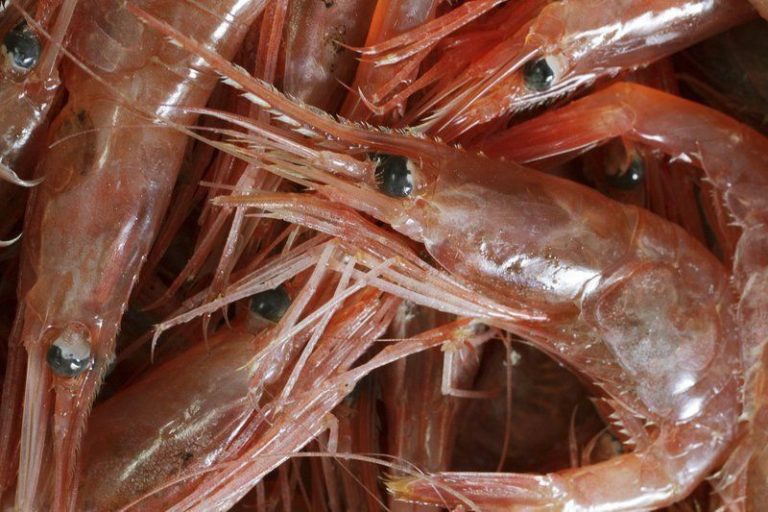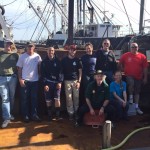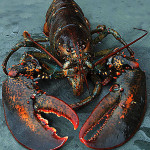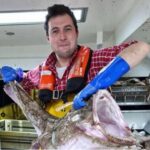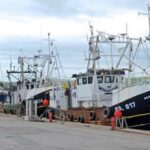Tag Archives: Gulf of Maine
Cod prohobition imperils deep-sea fishing charter businesses
 Gibson said the ban on cod possession probably will remain for two years and could last a generation if cod stocks don’t recover. In recent years, a ban on cod possession lasted only a few months. During those months, business dropped by half, said Tim Tower, who runs Bunny Clark Deep Sea Fishing in Ogunquit. “They said, ‘We won’t be going out fishing again until we can keep cod,’” Tower said. Read more here 22:52
Gibson said the ban on cod possession probably will remain for two years and could last a generation if cod stocks don’t recover. In recent years, a ban on cod possession lasted only a few months. During those months, business dropped by half, said Tim Tower, who runs Bunny Clark Deep Sea Fishing in Ogunquit. “They said, ‘We won’t be going out fishing again until we can keep cod,’” Tower said. Read more here 22:52
Behind the Curve? Fast-Warming Gulf of Maine Offers Hint of Future for Oceans
 The waters off the coast of New England are warming more rapidly than almost any other ocean region on earth. Scientists are now studying the resulting ecosystem changes, and their findings could provide a glimpse of the future for many of the world’s coastal communities. Read the rest here 12:53
The waters off the coast of New England are warming more rapidly than almost any other ocean region on earth. Scientists are now studying the resulting ecosystem changes, and their findings could provide a glimpse of the future for many of the world’s coastal communities. Read the rest here 12:53
UPDATED – New Hampshire’s small commercial fishing fleet is reeling – at odds with NOAA over cod reductions
 “The fishermen vehemently dispute this latest assessment,” said David Goethel, captain of the F/V Ellen Diane out of Hampton Harbor. He’s served on the New England Fisheries Management Council and fished for more than two decades, and said the new measures may put him out of business. “It’s a completely idiotic program,” he said. “It is intended to kill fish and kill fishermen.” Read the rest here 09:09 and On the Seacoast, cod fishing blues read it here 10:23
“The fishermen vehemently dispute this latest assessment,” said David Goethel, captain of the F/V Ellen Diane out of Hampton Harbor. He’s served on the New England Fisheries Management Council and fished for more than two decades, and said the new measures may put him out of business. “It’s a completely idiotic program,” he said. “It is intended to kill fish and kill fishermen.” Read the rest here 09:09 and On the Seacoast, cod fishing blues read it here 10:23
Commercial harvester says seals, not climate change, is the reason for decline of cod in New England
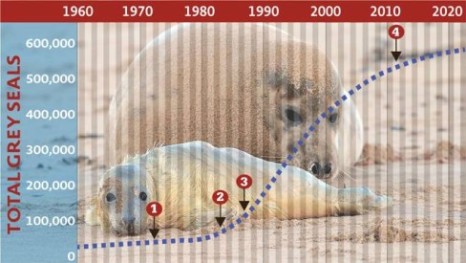 An Associated Press story recently drew a comparison between the decline of cod in the United States with what happened to the northern cod stocks in the late 1980s and 1990s that impacted Canada’s east coast communities and changed the face of the fishery in this province. Read the rest here 08:20
An Associated Press story recently drew a comparison between the decline of cod in the United States with what happened to the northern cod stocks in the late 1980s and 1990s that impacted Canada’s east coast communities and changed the face of the fishery in this province. Read the rest here 08:20
Feds Add Fishing Restrictions for Atlantic Cod – will have a significant economic impact on some fishermen
 Regulators are closing areas where most of the cod catches have occurred over the last couple of years to protect the remaining stock. Most of those areas will be off the coast of Massachusetts and New Hampshire, impacting those who fish the inshore waters there. The emergency plan goes into effect Thursday, and will remain in place until May. ,,, Read the rest here 19:29
Regulators are closing areas where most of the cod catches have occurred over the last couple of years to protect the remaining stock. Most of those areas will be off the coast of Massachusetts and New Hampshire, impacting those who fish the inshore waters there. The emergency plan goes into effect Thursday, and will remain in place until May. ,,, Read the rest here 19:29
Guest View: Saving cod won’t be easy
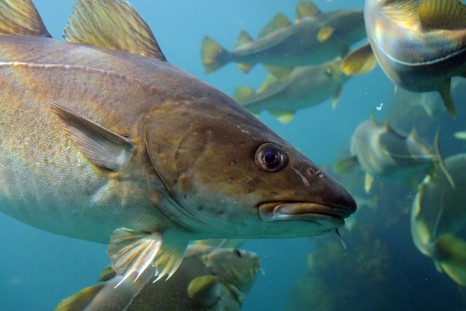 Cod, the fish that has fueled New England seaport economies for nearly four centuries, have all but disappeared from the Gulf of Maine, and recent stock surveys indicate that even with tightened catch limits, their numbers are not rebounding as hoped., There are a variety of reasons for the ongoing decline, not the least of which is a changing marine ecosystem driven by climate change. According to the region’s leading scientists, Read the rest here 07:46
Cod, the fish that has fueled New England seaport economies for nearly four centuries, have all but disappeared from the Gulf of Maine, and recent stock surveys indicate that even with tightened catch limits, their numbers are not rebounding as hoped., There are a variety of reasons for the ongoing decline, not the least of which is a changing marine ecosystem driven by climate change. According to the region’s leading scientists, Read the rest here 07:46
Cod crisis: Iconic species faces an uncertain future
 Our cod crisis has become a sad cliche, ironic enough to catch the eye of the national media, and the truth does indeed hurt. Just ask Chatham and Harwich fishermen, who fished in what was once one of the top cod ports in the country but now catch mostly skates and dogfish and very little cod. Read the rest here 08:18
Our cod crisis has become a sad cliche, ironic enough to catch the eye of the national media, and the truth does indeed hurt. Just ask Chatham and Harwich fishermen, who fished in what was once one of the top cod ports in the country but now catch mostly skates and dogfish and very little cod. Read the rest here 08:18
Bigelow Lab in the summer found a record-low growth rate for plankton, a crucial food source.
 In recent years, the researchers have measured a fivefold decline in the growth rate of phytoplankton, an indication of lower levels of the critical single-celled plants at the bottom of the marine food chain. Because phytoplankton are food for fish larvae, a lower abundance of phytoplankton could mean lower numbers of adult fish populations years from now, Balch said Based on measurements this year between June and September, however, the growth rate of phytoplankton is on pace to be at the lowest level since 2001. Read the rest here 08:24
In recent years, the researchers have measured a fivefold decline in the growth rate of phytoplankton, an indication of lower levels of the critical single-celled plants at the bottom of the marine food chain. Because phytoplankton are food for fish larvae, a lower abundance of phytoplankton could mean lower numbers of adult fish populations years from now, Balch said Based on measurements this year between June and September, however, the growth rate of phytoplankton is on pace to be at the lowest level since 2001. Read the rest here 08:24
Researchers discover ‘spectacular’ coral formations in the Gulf of Maine – Video
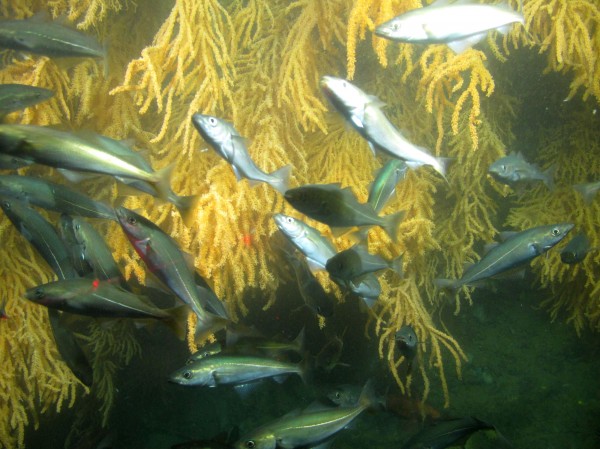 Long known as a place rich in seafood, the Gulf of Maine also is home to “spectacular” formations of deep sea corals, scientists have discovered. Researchers using a remotely controlled submersible vehicle this summer found “dense hanging gardens” Read the rest here 18:01
Long known as a place rich in seafood, the Gulf of Maine also is home to “spectacular” formations of deep sea corals, scientists have discovered. Researchers using a remotely controlled submersible vehicle this summer found “dense hanging gardens” Read the rest here 18:01
Scientists, fishermen at odds on cod stock in Gulf of Maine
 “Look at it all. It’s beautiful,” said Jongerden, general manager of the Portland Fish Exchange. But all that cod should not be there, according to a report last month by the National Oceanic and Atmospheric Administration that found the number of cod of reproductive age in the Gulf of Maine has hit an all-time low – only 3 percent to 4 percent of what’s needed for a sustainable fishery. Read the rest here 08:59
“Look at it all. It’s beautiful,” said Jongerden, general manager of the Portland Fish Exchange. But all that cod should not be there, according to a report last month by the National Oceanic and Atmospheric Administration that found the number of cod of reproductive age in the Gulf of Maine has hit an all-time low – only 3 percent to 4 percent of what’s needed for a sustainable fishery. Read the rest here 08:59
Gulf of Maine: ‘Poster child’ for global warming
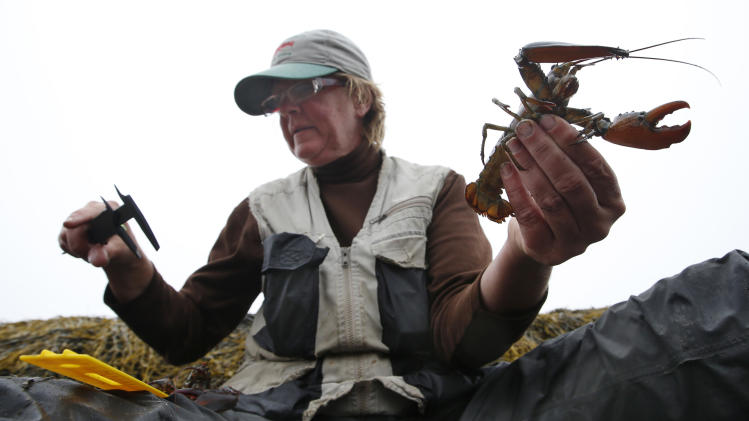 Long-established species of commercial fish, like cod, herring and northern shrimp, are departing for colder waters. Black sea bass, blue crabs and new species of squid — all highly unusual for the Gulf — are turning up in fishermen’s nets. The Gulf of Maine’s warming reflects,, Lots of info that appears to be new.BH Read the rest here 07:54
Long-established species of commercial fish, like cod, herring and northern shrimp, are departing for colder waters. Black sea bass, blue crabs and new species of squid — all highly unusual for the Gulf — are turning up in fishermen’s nets. The Gulf of Maine’s warming reflects,, Lots of info that appears to be new.BH Read the rest here 07:54
Another Cod Story – Cod forsaking the Gulf of Maine
 The prospects for restoring the cod population in the Gulf of Maine to a commercially sustainable level seem to be getting even more dismal than before. The Maine Coast Fishermen’s Association released a statement that suggests the stock assessment doesn’t jibe with what fishermen have seen. Read the rest here 21:17
The prospects for restoring the cod population in the Gulf of Maine to a commercially sustainable level seem to be getting even more dismal than before. The Maine Coast Fishermen’s Association released a statement that suggests the stock assessment doesn’t jibe with what fishermen have seen. Read the rest here 21:17
Codfish numbers at key fishery hits all-time low
“The analysis really presents a grim picture for the recovery of the stock,” Brown said. “Every indicator of the stock condition has declined or worsened between 2011 and 2013.” <Read more here> 09:52
UNE Professor Presents Significant Dogfish Findings
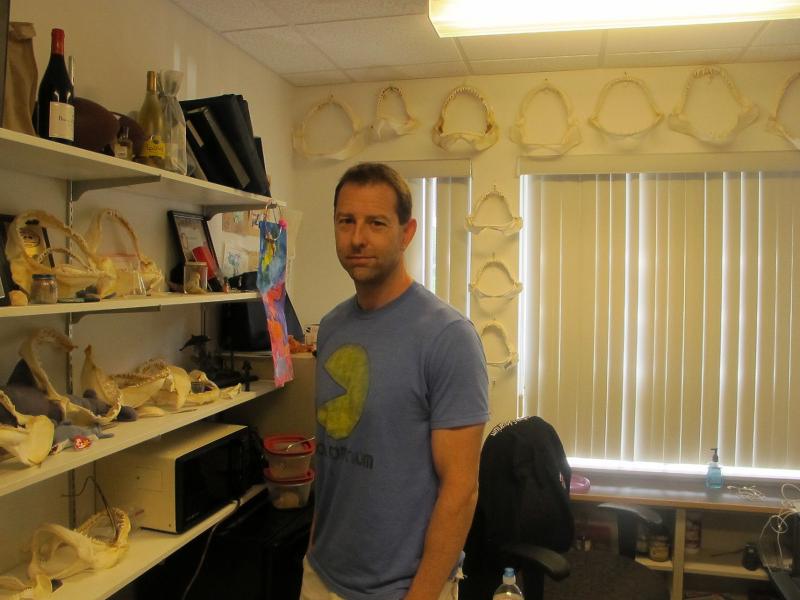 One key finding, says Sulikowsi, is that dogfish do not only dwell at the bottom of the ocean, as widely believed. He says this research shows them living up and down the water column, which means that trawler surveys do not give us the whole picture, which in turn means their numbers might be significantly underrepresented. <Read more here> 12:42
One key finding, says Sulikowsi, is that dogfish do not only dwell at the bottom of the ocean, as widely believed. He says this research shows them living up and down the water column, which means that trawler surveys do not give us the whole picture, which in turn means their numbers might be significantly underrepresented. <Read more here> 12:42
Reopening Cashes – In a briny preserve, fish and controversy thrive
 This prospect — even if the most sensitive areas remain protected — has infuriated environmental advocates, who worry about harming the ledge’s unique biodiversity and further damaging already dramatically reduced cod populations. Vito Giacalone says fishermen are “just looking for some common sense.” Read more here 11:54
This prospect — even if the most sensitive areas remain protected — has infuriated environmental advocates, who worry about harming the ledge’s unique biodiversity and further damaging already dramatically reduced cod populations. Vito Giacalone says fishermen are “just looking for some common sense.” Read more here 11:54
Maine’s shrimp fishery may face new restrictions
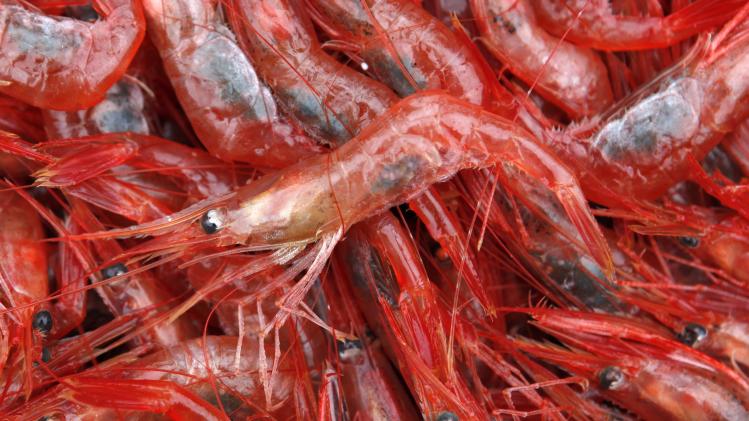 Federal regulators (ASMFC) may limit the number of fishermen allowed to catch northern shrimp in the Gulf of Maine once the depleted fishery reopens.,,considering restrictions that could limit the number of licenses to fish for shrimp or the number of vessels allowed in the fishery. (catch shares?) The number of vessels in the fishery has fluctuated since 2000, with a low of 144 in 2006 and a high of 342 in 2011. Maine issued an average of 463 licenses per year from 2001 to 2011. The shrimp section also sets a total allowable catch limit every year. Read more here 07:30
Federal regulators (ASMFC) may limit the number of fishermen allowed to catch northern shrimp in the Gulf of Maine once the depleted fishery reopens.,,considering restrictions that could limit the number of licenses to fish for shrimp or the number of vessels allowed in the fishery. (catch shares?) The number of vessels in the fishery has fluctuated since 2000, with a low of 144 in 2006 and a high of 342 in 2011. Maine issued an average of 463 licenses per year from 2001 to 2011. The shrimp section also sets a total allowable catch limit every year. Read more here 07:30
Where do local fish come from? UNH says Red’s Best
 Red’s Best is a Boston-based fish processor which caters to several fishermen fishing in the Gulf of Maine. For the pilot program, UNH Dining will be purchasing seafood from Red’s Best due to their capability of meeting the demands of the university and their support of NH fishermen through the Yankee Fishermen’s Cooperative. Read more here 09:03
Red’s Best is a Boston-based fish processor which caters to several fishermen fishing in the Gulf of Maine. For the pilot program, UNH Dining will be purchasing seafood from Red’s Best due to their capability of meeting the demands of the university and their support of NH fishermen through the Yankee Fishermen’s Cooperative. Read more here 09:03
Thousands of alewives return to Penobscot, tributaries after nearly 200 years without adequate access to upstream habitat
 After nearly 200 years without adequate access to upstream habitat, the alewives finally are back. And not just a few of the river herring have returned. We’re talking thousands … and thousands … and thousands. Read more here 11:19
After nearly 200 years without adequate access to upstream habitat, the alewives finally are back. And not just a few of the river herring have returned. We’re talking thousands … and thousands … and thousands. Read more here 11:19
V-notched lobster decline is a threatening sign in Maine
Lobstermen’s efforts to mark egg-bearing female lobsters with a V-notch on their tail have been on the decline since 2008, which could put pressure on the future health of the state’s most lucrative fishery, state officials said. Read more here 16:04
Climate Change Forces Reevaluation of Fishery Management. (Isn’t that right, John?)
Scientists now think that altered zooplankton populations may be one reason cod stocks haven’t rebounded as quickly as expected. In addition, water temperatures in southern New England are getting uncomfortably warm for cod. So they’re moving northward and offshore in search of cooler water.. And they’re not alone. Over the past fifty years, more than half of all commercially exploited species have responded to warming waters by changing where they live. That includes the fish that used to fill Eldredge’s weir. Read [email protected] 21:57
Northern Shrimp: first casualty of New England warming water? – Tragically, the answer is maybe
 The Gulf of Maine is the southernmost extent of the range for this cold water species and the water in the Gulf has been getting warmer since the 1960s (see graph). Shrimp require specific water temperature and chemistry during spawning and for larval shrimp survival. In the past, shrimp success has been lower during warm water events in the Gulf of Maine. It is possible that the warming trend in the Gulf of Maine is causing spawning events to not occur or to have very low survival rates for larval shrimp. Read more@workingwaterfront 08:36
The Gulf of Maine is the southernmost extent of the range for this cold water species and the water in the Gulf has been getting warmer since the 1960s (see graph). Shrimp require specific water temperature and chemistry during spawning and for larval shrimp survival. In the past, shrimp success has been lower during warm water events in the Gulf of Maine. It is possible that the warming trend in the Gulf of Maine is causing spawning events to not occur or to have very low survival rates for larval shrimp. Read more@workingwaterfront 08:36
Opinion: NMFS Rule Recognizes that Fish Need Habitat, and if they don’t we’ll sue the sh!t out of ’em!
 Today, the National Marine Fisheries Service (NMFS) issued the final regulation regarding commercial fishing access to the longstanding protected habitat areas in the Gulf of Maine, southern New England, and Georges Bank. In May of this year, Conservation Law Foundation (CLF) sued NMFS over a related proposal to allow new fishing in over 5000 square miles of protected ocean habitat areas in New England. CLF brought the lawsuit due to a strong concern more@talkingfish 17:23
Today, the National Marine Fisheries Service (NMFS) issued the final regulation regarding commercial fishing access to the longstanding protected habitat areas in the Gulf of Maine, southern New England, and Georges Bank. In May of this year, Conservation Law Foundation (CLF) sued NMFS over a related proposal to allow new fishing in over 5000 square miles of protected ocean habitat areas in New England. CLF brought the lawsuit due to a strong concern more@talkingfish 17:23
Loss of shrimp season hits the pocketbook hardest
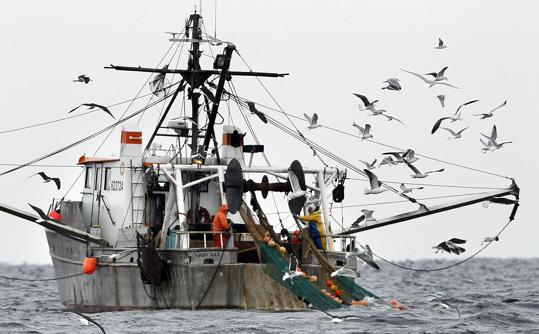 NOBLEBORO — Behind Tim Simmons’ house, down a hill past piles of coiled rope and brightly painted bundles of lobster buoys, sit 100 shrimp traps.The traps – some purple, some black, all relatively new – will remain unused this winter for the first time in the 14 years Simmons has been shrimping in the Gulf of Maine. “It’s hard to have them sitting there not making money,” Simmons said Thursday, three days after regulators announced there will be no 2014 season. more@portlandpress 12:07
NOBLEBORO — Behind Tim Simmons’ house, down a hill past piles of coiled rope and brightly painted bundles of lobster buoys, sit 100 shrimp traps.The traps – some purple, some black, all relatively new – will remain unused this winter for the first time in the 14 years Simmons has been shrimping in the Gulf of Maine. “It’s hard to have them sitting there not making money,” Simmons said Thursday, three days after regulators announced there will be no 2014 season. more@portlandpress 12:07
Maine Shrimp: “We are screwed,” – Warming ocean, absence of springtime plankton surge, predation by other species, and of course the “obligatory” overfishing
 An advisory council had recommended that the fishery remain open on a limited basis in 2014, from mid-February through March. Past seasons have run from December through May. Spencer Fuller, the shrimp product line manager for Cozy Harbor Seafood in Portland, said that recommendation was rejected by the commission, which represents Maine, New Hampshire and Massachusetts. He said the compromise would have kept the industry going and prevented its reputation from being damaged in world markets. “We felt the risk of any damage to the fishery based on that proposal would have been minimal,” Fuller said. “We certainly don’t agree with (the commission’s) Draconian approach.” more@portlandpress 17:50
An advisory council had recommended that the fishery remain open on a limited basis in 2014, from mid-February through March. Past seasons have run from December through May. Spencer Fuller, the shrimp product line manager for Cozy Harbor Seafood in Portland, said that recommendation was rejected by the commission, which represents Maine, New Hampshire and Massachusetts. He said the compromise would have kept the industry going and prevented its reputation from being damaged in world markets. “We felt the risk of any damage to the fishery based on that proposal would have been minimal,” Fuller said. “We certainly don’t agree with (the commission’s) Draconian approach.” more@portlandpress 17:50
Cool Fish, Hot Water III – Black Sea Bass
 Previous posts in our Cool Fish, Hot Water series have introduced two of the species that are moving into the Gulf of Maine, Black Sea Bass as water temperatures rise: seahorses and longfin squid. While seahorses are still an occasional visitor, New England’s longfin squid fishery has taken off in response to squid’s increased abundance. This time, we’ll focus on another species with commercial potential—black sea bass. [email protected] 12:37
Previous posts in our Cool Fish, Hot Water series have introduced two of the species that are moving into the Gulf of Maine, Black Sea Bass as water temperatures rise: seahorses and longfin squid. While seahorses are still an occasional visitor, New England’s longfin squid fishery has taken off in response to squid’s increased abundance. This time, we’ll focus on another species with commercial potential—black sea bass. [email protected] 12:37
Fewer right whales seen, counted in Gulf of Maine
 Only one North Atlantic right whale was spotted in the Gulf of Maine this fall by biologists who are tracking the species. “Right whales have different feeding areas at different times of year,” LaCasse said. Their year-round habitat extends from the Canadian Maritimes to southern New England, but the whales move in search of food. Their whereabouts, regardless of the time of year, are likely tied primarily to food and the conditions of the ecosystem in which they thrive, marine scientists said. “These whales are grazers,” said Mayo. “It’s a moving feast, quite literally, for these animals. Wherever they are, I guarantee that they’re sitting on a pile of food.” more@kennebecjournal 05:53
Only one North Atlantic right whale was spotted in the Gulf of Maine this fall by biologists who are tracking the species. “Right whales have different feeding areas at different times of year,” LaCasse said. Their year-round habitat extends from the Canadian Maritimes to southern New England, but the whales move in search of food. Their whereabouts, regardless of the time of year, are likely tied primarily to food and the conditions of the ecosystem in which they thrive, marine scientists said. “These whales are grazers,” said Mayo. “It’s a moving feast, quite literally, for these animals. Wherever they are, I guarantee that they’re sitting on a pile of food.” more@kennebecjournal 05:53
Gulf of Maine Shrimp season may be a non-starter
In a report prepared last week, the Northern Shrimp Technical Committee of the Atlantic States Marine Fisheries Commission said it will recommend a total “moratorium on fishing in 2014 to maximize spawning potential” of the Gulf of Maine shrimp population. more@GDT![]() 09:55
09:55
Not Enough (Cod)Fish In The Sea? – Audio and Counting Fish | Estimating the Gulf of Maine’s Fish Population
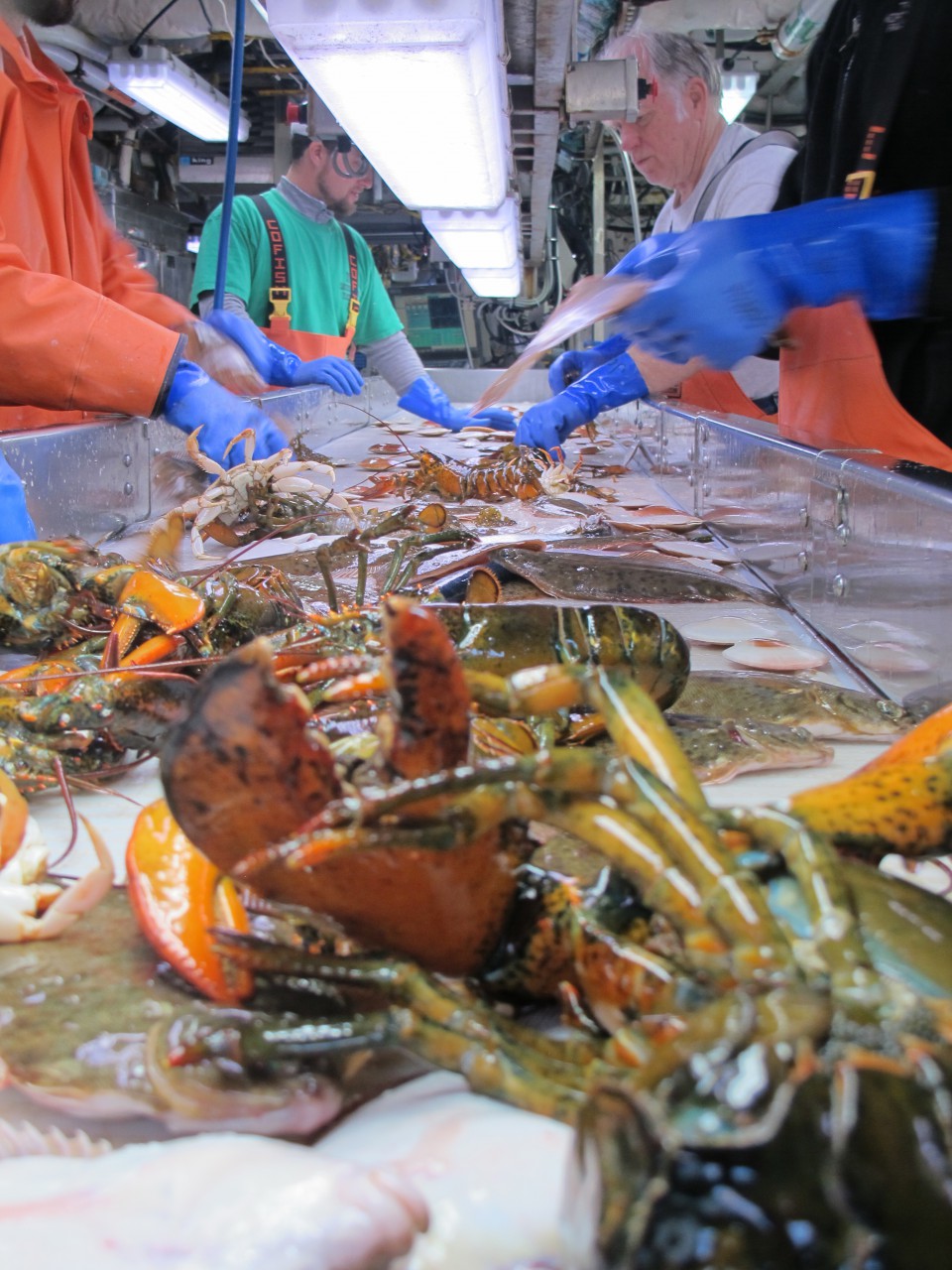 Not Enough (Cod)Fish In The Sea? – There’s long been a debate over exactly how many fish there are in the sea — especially cod. Cod has been overfished for decades and because of that, strict catch limits were put in place, particularly in the Gulf of Maine where cod were once plentiful. more@wbur
Not Enough (Cod)Fish In The Sea? – There’s long been a debate over exactly how many fish there are in the sea — especially cod. Cod has been overfished for decades and because of that, strict catch limits were put in place, particularly in the Gulf of Maine where cod were once plentiful. more@wbur
Counting Fish | Estimating the Gulf of Maine’s Fish Population – My shift ends at midnight. I deliver Ziploc bags of herring heads to the walk-in freezer, power-wash the fish gunk off my foul-weather gear, and turn my workstation over to the night watch, who will work until noon. I’ve been on duty aboard the Henry B. Bigelow,, more@yankee 10:37
Attn Gillnet Fishermen: Gulf of Maine Gillnet Fishery Closure to Protect Harbor Porpoise WILL NOT be implemented tomorrow!
 Today
Today Message to Maine fishermen: Adapt to climate change – The Gulf of Maine has experienced significant warming over the past 40 years
The Gulf of Maine has experienced significant warming over the past 40 years, said biologist and ecologist Andrew Pershing of the University of Maine/Gulf of Maine Research Institute. Since 2004, the warming has accelerated to 10 times the rate of previous years. continued@portlandpress

































